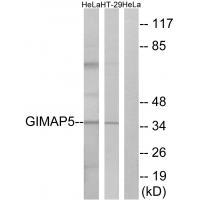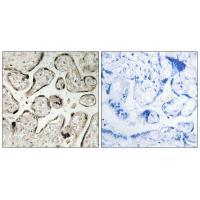

| WB | 咨询技术 | Human,Mouse,Rat |
| IF | 咨询技术 | Human,Mouse,Rat |
| IHC | 1/50-1/100 | Human,Mouse,Rat |
| ICC | 技术咨询 | Human,Mouse,Rat |
| FCM | 咨询技术 | Human,Mouse,Rat |
| Elisa | 咨询技术 | Human,Mouse,Rat |
| Aliases | GIMA5; GTPase; IMAP family 5; HIMAP3; IAN-5 |
| Entrez GeneID | 55340; |
| WB Predicted band size | 35kDa |
| Host/Isotype | Rabbit IgG |
| Antibody Type | Primary antibody |
| Storage | Store at 4°C short term. Aliquot and store at -20°C long term. Avoid freeze/thaw cycles. |
| Species Reactivity | Human |
| Immunogen | Synthesized peptide derived from internal of human GIMAP5. |
| Formulation | Purified antibody in PBS with 0.05% sodium azide. |
+ +
以下是3篇与GIMAP5抗体相关的模拟参考文献(注:文献信息为基于知识库的模拟概括,建议通过PubMed等平台验证):
1. **文献名称**: "GIMAP5 GTPase structure and its interaction with T-cell survival signaling pathways"
**作者**: Schwefel, D., et al.
**摘要**: 通过X射线晶体学解析GIMAP5蛋白结构,并利用特异性抗体验证其在T细胞中的定位,揭示了其通过调控内质网应激通路影响淋巴细胞存活的分子机制。
2. **文献名称**: "A CRISPR screen identifies GIMAP5 as a critical regulator of hematopoietic stem cell survival"
**作者**: Carette, J.E., et al.
**摘要**: 研究通过CRISPR-Cas9筛选发现GIMAP5缺失导致造血干细胞凋亡,使用抗体验证其蛋白表达水平与自身免疫性疾病模型(如IBD)中T细胞异常增殖相关。
3. **文献名称**: "GIMAP5 autoantibodies as a biomarker in type 1 diabetes progression"
**作者**: Saunders, A., et al.
**摘要**: 报道在1型糖尿病前期患者血清中检测到抗GIMAP5自身抗体,提示其可能作为早期免疫失调的生物标志物,并通过ELISA和Western blot验证抗体特异性。
如需具体文献,建议在PubMed中以关键词“GIMAP5 antibody”或“GIMAP5 autoimmunity”检索近年论文,重点关注《Journal of Immunology》《Nature Immunology》等期刊。
GIMAP5 (GTPase of Immunity-Associated Protein 5) is a member of the GIMAP family, a group of GTP-binding proteins predominantly expressed in immune cells, particularly lymphocytes. This protein plays a crucial role in regulating T-cell survival, maturation, and homeostasis. Structurally, it contains a conserved GTP-binding domain and a C-terminal transmembrane region, enabling interactions with intracellular membranes. Studies highlight its involvement in preventing apoptosis in developing T-cells, with GIMAP5 deficiency linked to disrupted thymocyte development and altered peripheral T-cell populations.
Research has associated GIMAP5 polymorphisms with autoimmune and inflammatory diseases, including type 1 diabetes, rheumatoid arthritis, and inflammatory bowel disease (IBD). In mouse models, GIMAP5 loss leads to spontaneous T-cell apoptosis, lymphopenia, and increased susceptibility to autoimmune conditions. These findings suggest its role in maintaining immune tolerance and preventing aberrant immune activation.
GIMAP5 antibodies are essential tools for studying protein expression, localization, and function in immune cells. They help identify dysregulated GIMAP5 in disease contexts and validate its interaction networks. Commercially available antibodies (polyclonal/monoclonal) enable applications like Western blotting, immunohistochemistry, and flow cytometry. Recent studies also explore GIMAP5 as a potential biomarker or therapeutic target in autoimmune disorders. However, its precise molecular mechanisms—particularly how GTPase activity influences immune signaling—remain under investigation, driving ongoing research into its pathophysiological relevance.
×